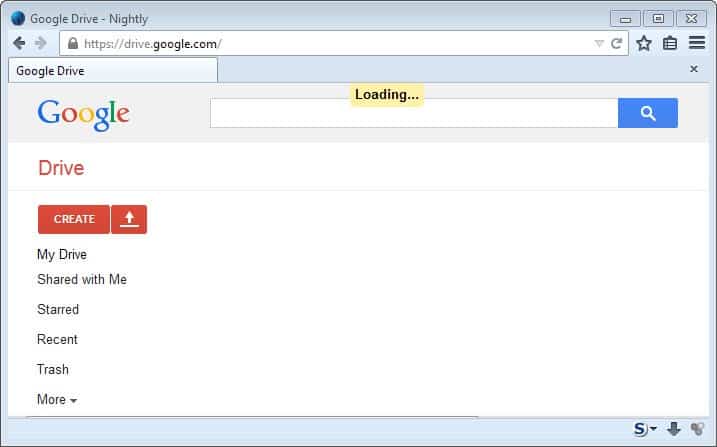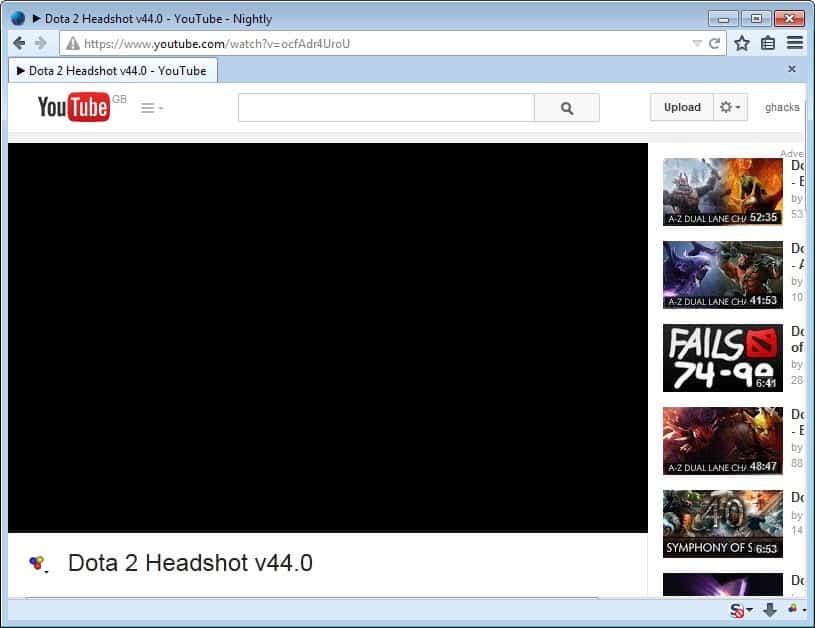New Firefox Cache Backend causes issues on Google Drive and YouTube

If you are running Firefox Nightly, the cutting edge version of the web browser that gets all the latest feature additions first, you may have noticed that several sites stopped working properly after the most recent update of the browser.
Mozilla has enabled the new HTTP cache backend in the browser which we did review back in 2013. The main goal of the project was to improve the stability of the cache to make it resilient against crashes and kills of the Firefox process.
The final cache backend will resolve all hangs or freezes in the browser that are cache related. In addition to that, it is also designed to speed up the loading of cached items. This worked well for most configurations back in 2013 but not for all.
While you would have noticed an improvement on slow hard drives, you would actually notice slower access times on faster drives such as Solid State Drives.
This cache backend has been enabled by Mozilla as of today. While it works fine for the most part, it is causing issues on select sites.
On Google Drive, you may notice that documents are not loaded at all, and that a loading notification is displayed on listing pages that does not go away.
On YouTube, HTML5 video playback is broken which means that you will see a black screen and nothing else.
Mozilla is working on a fix as we speak. There is a temporary workaround though which you may find useful. Actually, there are two:
- Type about:config into Firefox's address bar and hit enter.
- Confirm you will be careful if a warning message comes up.
- Search for browser.cache.use_new_backend_temp.
- Double-click the preference name to change its value to false. This disables the new backend.
- Restart the browser.
Disabling the new HTTP cache backend resolves the issues that you notice on affected websites.
The second option that you have works similar to that, only that you keep the new cache backend enabled and add another preference to the browser. Repeat steps 1-2 above and continue with the instructions below afterwards.
- Right-click and select New > Integer.
- Name it browser.cache.disk.preload_chunk_count
- Set its value to 0 with a double-click.
Both solutions work at the time of writing. Mozilla will release a fix for them shortly. The best solution in my opinion is to disable the new backend until the issues get fixed, as you do not need to create a new preference this way. (via Sören)
Update: Before and after load time comparison has been posted on this site. The new cache beats the old now every time according to it, and while I would hold my breath until we get a scientific comparison, you may notice faster load times especially if you run firefox's cache on slow storage devices.
There are also two new preferences related to the cache:
- browser.cache.disk.preload_chunk_count - determines the number of data chunks that Firefox preloads. The default value is four with each data chunk having a size of 256 Kilobyte.
- browser.cache.disk.metadata_memory_limit - how many cache entries metadata Firefox keeps in memory. The default size is 250 Kilobyte.




















cannot find that “_temp”
http://i.imgur.com/Pz04Ce9.png
Are you running Firefox 31 or newer?
and then it crashes again
I’ve not used a cache since you told us about how it can be used to track you around the web. There’s no noticeable speed difference anywhere, although I have a fast connection.
Wonder if this feature is coming to Pale Moon? I’ve been using Pale Moon ever since Australis chased me off from using Firefox (and the old-style UI is simply amazing). But even Pale Moon has a tendency to crash just like the latest versions of Firefox were before (based on same source and whatnot).
Firefox used to rarely crash, and lately it seems it likes to crash regularly…
You should ask on the pale moon forum, both for the cache and for your crashes issues.